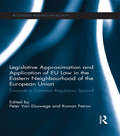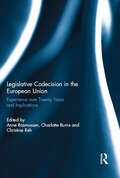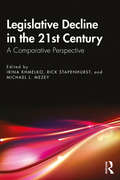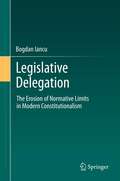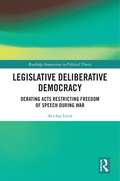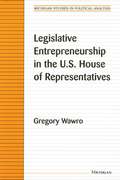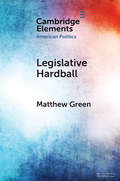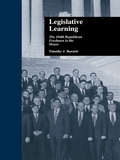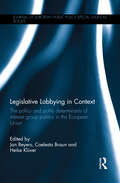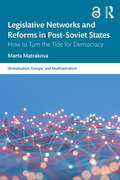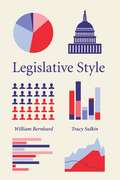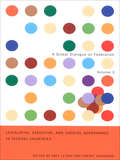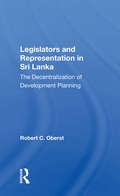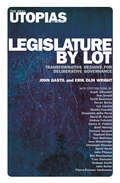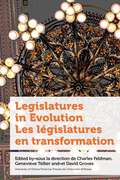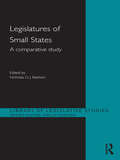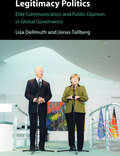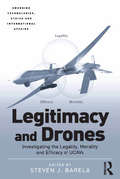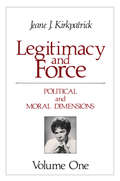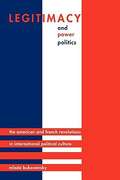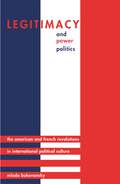- Table View
- List View
Legislative Approximation and Application of EU Law in the Eastern Neighbourhood of the European Union: Towards a Common Regulatory Space? (Routledge Research in EU Law)
by Peter Van Elsuwege and Roman PetrovThis book explores the exportation and application of European Union legislation beyond EU borders. It clarifies the means and instruments of the voluntary application of the EU’s norms by third countries and analyses in detail the process of legislative approximation between the EU and its East European neighbours. It also assesses the extent to which the EU is successful in promoting its legal standards abroad. The first part of the book addresses the EU’s mechanisms and instruments promoting the export of its own laws and practices to other countries. Key issues include the post-Lisbon constitutional basis for the EU’s engagement with its Eastern neighbours (Art. 8 TEU); the different methods of acquis export and the impact of a new generation of Association Agreements providing for the establishment of Deep and Comprehensive Free Trade Areas (DCFTAs) and, ultimately, a Neighbourhood Economic Community (NEC) between the EU and its Eastern partners. The second part of the book includes substantive country reports that analyse the process of legislative approximation and application of EU law in the Eastern Partnership countries and Russia, authored by leading academics from the countries concerned. While currently these countries are not working towards full EU membership, the EU encourages them to approximate and converge their legislation with the EU acquis. The book also offers a unique picture of current practice of the application of EU law by judiciaries in the countries of the Eastern Partnership and Russia. The book concludes with reflections on the multi-faceted character of legislative approximation and the challenges surrounding the application of EU law in the EU’s Eastern neighbourhood. The conclusions reached are highly informative as to the effectiveness of present and future EU external regional policies aimed at the promotion of EU common values and EU legislation into the legal orders of third countries.
Legislative Codecision in the European Union: Experience over Twenty Years and Implications (ISSN)
by Anne Rasmussen, Charlotte Burns and Christine RehThis volume takes stock of twenty years of practising and studying codecision in the European Union (EU) and examines the procedure‘s long-term implications for the EU‘s institutions, politics and policies. The introduction of co-legislation between the Council of Ministers and the European Parliament in 1993 raised the prospect of increased parliamentary involvement in EU decision-making and promised a new era of more transparent, inclusive and accountable policy-making. This collection draws together contributions from diverse theoretical and methodological perspectives in order to analyse the extent to which codecision has delivered the expected gains and to review the unexpected effects that have followed from its introduction, such as the growing informalisation of EU decision-making. Using a combination of in-depth qualitative case studies, wider quantitative analyses, practitioners insights and a review of the procedure‘s democratic legitimacy the contributions offer a holistic assessment of the effect of co-decision on the political system of the EU.This book was published as a special issue of the Journal of European Public Policy.
Legislative Decline in the 21st Century: A Comparative Perspective
by Michael L. Mezey Rick Stapenhurst Irina KhmelkoIrina Khmelko, Frederick Stapenhurst, and Michael L. Mezey have assembled an authoritative guide to the declining institutional capacities of legislatures around the world. Case studies represent a diverse sample of countries, ranging from newer democracies emerging from the post-communist world to more established but at times fragile democracies in Asia. Although largely focused on newer democratic systems, readers will be able to identify key factors that explain the general global trend toward the empowerment of executives at the expense of national legislatures. The cases, although different from one another, identify several factors that have explained the erosion of legislative power, including historical legacies, institutional design, economic factors, external factors, political polarization, personalization of politics, and the rise of populism. Original data and the presentation of testable theoretical propositions about the growing imbalance between executives and national legislatures moves the field in a promising new direction. Legislative Decline in the 21st Century will be of interest to students and scholars of Legislative Studies and Comparative Politics. Lessons drawn from these case studies will allow policy makers to explore new solutions that can lead to the improved quality of democracy in countries around the world.
Legislative Delegation
by Bogdan IancuAn overarching question of contemporary constitutionalism is whether equilibriums devised prior to the emergence of the modern administrative-industrial state can be preserved or recreated by means of fundamental law. The book approaches this problem indirectly, through the conceptual lens offered by constitutional developments relating to the adoption of normative limitations on the delegation of law-making authority. Three analytical strands (constitutional theory, constitutional history, and contemporary constitutional and administrative law) run through the argument. They merge into a broader account of the conceptual ramifications, the phenomenon, and the constitutional treatment of delegation in a number of paradigmatic legal systems. As it is argued, the development and failure of constitutional rules imposing limits on legislative delegation reveal the conditions for the possibility of classical limited government and, conversely, the erosion of normativity in contemporary constitutionalism.
Legislative Deliberative Democracy: Debating Acts Restricting Freedom of Speech during War (Routledge Innovations in Political Theory)
by Avichai LevitFreedom of speech is a basic right in a democracy. During war however, national legislatures tend to enact laws that restrict this basic right. Under what circumstances can such laws be democratically legitimate? Avichai Levit argues that the degree of democratic legitimacy of laws that restrict freedom of speech during war, depends on the extent of legislature deliberation on such laws. The more law makers in both chambers of the legislature, seriously consider information and arguments, reason on the common good, and seek to persuade and decide the best legislative outcome, in committees and on the floor, the more democratic legitimacy can be associated with such laws. This book fills a gap in the scholarly literature regarding the evaluation of the democratic legitimacy of laws restricting freedom of speech during war, by bridging different theoretical perceptions and presenting an alternative normative account of deliberative democracy which focuses on the deliberations of a national legislature. Using the United States as a case study, this book goes into the details of Congressional deliberation during World War I, World War II and the Cold War, as well as the political histories that brought about such laws. Legislative Deliberative Democracy will be of interest to academics and students alike in the fields of American Constitutional law, Political theory, American politics and political history.
Legislative Development in Africa: Politics and Postcolonial Legacies
by Ken OpaloWhat explains contemporary variations in African legislative institutions – including their strengths and weaknesses? Compared with the more powerful executive branches, legislatures throughout the continent have historically been classified as weak and largely inconsequential to policy-making processes. But, as Ken Ochieng' Opalo suggests here, African legislatures actually serve important roles, and under certain conditions, powerful and independent democratic legislatures can emerge from their autocratic foundations. In this book, Opalo examines the colonial origins of African legislatures, as well as how postcolonial intra-elite politics structured the processes of adapting inherited colonial legislatures to local political contexts and therefore continued legislative development. Through case studies of Kenya and Zambia, Opalo offers a comparative longitudinal study of the evolution of legislative strength and institutionalization as well as a regional survey of legislative development under colonial rule, postcolonial autocratic single-party rule, and multiparty politics throughout Africa.
Legislative Effectiveness in the United States Congress
by Craig Volden Alan E. WisemanThis book explores why some members of Congress are more effective than others at navigating the legislative process and what this means for how Congress is organized and what policies it produces. Craig Volden and Alan E. Wiseman develop a new metric of individual legislator effectiveness (the Legislative Effectiveness Score) that will be of interest to scholars, voters, and politicians alike. They use these scores to study party influence in Congress, the successes or failures of women and African Americans in Congress, policy gridlock, and the specific strategies that lawmakers employ to advance their agendas.
Legislative Entrepreneurship in the U.S. House of Representatives
by Gregory WawroWhen members are elected to the House of Representatives they have a certain freedom to decide how they will act as members and how they will build their reputations. Just as in the market place entrepreneurs build businesses, so in the House of Representatives members have the freedom to choose to build legislative programs that will enhance their reputations in the institution. And yet entrepreneurship is also costly to members. Gregory Wawro explains why members of the House engage in legislative entrepreneurship by examining what motivates them to acquire policy knowledge, draft legislation, build coalitions, and push their legislation in the House. He considers what incentives members have to perform what many have perceived to be the difficult and unrewarding tasks of legislating. This book shows how becoming a legislative entrepreneur relates to members' goals of reelection, enacting good public policy, and obtaining influence in the House. The analysis differs from previous studies of this behavior, which for the most part have employed case study methods and have relied on anecdotal evidence to support their arguments. Wawro analyzes legislative entrepreneurship in a general and systematic fashion, developing hypotheses from rational-choice-based theories and testing these hypotheses using quantitative methods. Wawro argues that members engage in legislative entrepreneurship in order to get ahead within the House. He finds that the more legislative entrepreneurship that members engage in, the more likely it is that they will advance to prestigious positions. This book is of interest to students of Congress, legislative behavior and institutions, elections, and campaign finance. Gregory Wawro is Assistant Professor of Political Science, Columbia University.
Legislative Hardball: The House Freedom Caucus and the Power of Threat-Making in Congress (Elements in American Politics)
by Matthew GreenAssertive bargaining occurs from time to time in the US Congress. It became an important feature of legislative negotiations within the House Republican Party when, following the 2014 elections, a group of organized conservatives called the House Freedom Caucus regularly issued threats against its own party's leadership. Such behavior by an ideologically extreme bloc of lawmakers is not accounted for by existing theories of legislative politics. This Element posits explanations for why such threat-making might occur and what might increase its likelihood of success, then tests those explanations using the Freedom Caucus as a case study.
Legislative Learning: The 104th Republican Freshmen in the House (Politics and Policy in American Institutions #Vol. 1414)
by Timothy J. BarnettBarnett shows how political environments can produce legislators who place a premium on their policy-making goals through a nuanced exploration of factors undergirding member perceptions, policy ambitions, class cohesion, and legislative learning.
Legislative Lobbying in Context: The Policy and Polity Determinants of Interest Group Politics in the European Union (ISSN)
by Jan Beyers, Caelesta Braun and Heike KlüverThe lack of previous research into political interest groups and taking into account policy-specific and institutional context characteristics is largely due to research designs that have been primarily focused on a small number of policy debates, with the result that contextual characteristics were largely held constant. This book brings together articles from different modules that are part of a larger European Collaborative Research Project, INTEREURO, carried out by research teams in nine different countries under the auspices of the European Science Foundation. The main goal of the book is to analyse strategies, framing and influence processes for a set of 125 legislative proposals submitted by the European Commission, in an effort to better understand the involvement of interest organizations in the decision-making process of the EU. Contributors draw on sophisticated and innovative policy-driven samples of interest group mobilization, allowing them to account systematically for how policy-specific and institutional context factors shape mobilization, lobbying strategies and influence of interest groups on public policy debates in the EU. In this way, the book makes an important contribution to the study of interest groups in the EU and represents the breadth of positions taken in the current literature. This book was originally published as a special issue of the Journal of European Public Policy.
Legislative Networks and Reforms in Post-Soviet States: How to Turn the Tide for Democracy (Globalisation, Europe, and Multilateralism)
by Marta MatrakovaThis book presents the legislative networks in charge of drafting democratic reforms as gatekeepers to the actual adoption, implementation and internalisation of democratic norms in selected post-Soviet countries.It demonstrates that the composition of legislative networks which draft the legal reforms in Armenia, Georgia and Moldova, is controlled by powerful political actors who seek to have their preferences reflected in the reform outcomes. Furthermore, the book shows that there are limited modifications after the adoption of the first draft by these legislative networks, despite the later reform stages being the focus of the existing literature. The book’s analysis of political reforms in the Rule of Law, inter-institutional and electoral accountability in these three countries identifies the control strategies used by domestic political elite to restrain the space for democratisation, while instrumentalising the institutional framework to increase its power.This book will be of key interest to scholars and students of democratisation, post-Soviet studies, East European politics, EU politics and policy, comparative politics and international relations.
Legislative Style
by Tracy Sulkin William BernhardOnce elected, members of Congress face difficult decisions about how to allocate their time and effort. On which issues should they focus? What is the right balance between working in one’s district and on Capitol Hill? How much should they engage with the media to cultivate a national reputation? William Bernhard and Tracy Sulkin argue that these decisions and others define a “legislative style” that aligns with a legislator’s ambitions, experiences, and personal inclinations, as well as any significant electoral and institutional constraints. Bernhard and Sulkin have developed a systematic approach for looking at legislative style through a variety of criteria, including the number of the bills passed, number of speeches given, amount of money raised, and the percentage of time a legislator voted in line with his or her party. Applying this to ten congresses, representing twenty years of congressional data, from 1989 to 2009, they reveal that legislators’ activity falls within five predictable styles. These styles remain relatively consistent throughout legislators’ time in office, though a legislator’s style can change as career goals evolve, as well as with changes to individual or larger political interests, as in redistricting or a majority shift. Offering insight into a number of enduring questions in legislative politics, Legislative Style is a rich and nuanced account of legislators’ activity on Capitol Hill.
Legislative, Executive, and Judicial Governance in Federal Countries
by Katy Le Roy Cheryl SaundersComparative studies examine the constitutional design and actual operation of governments in Argentina, Australia, Austria, Canada, Germany, India, Nigeria, Russia, South Africa, Switzerland, and the United States. Contributors analyze the structures and workings of legislative, executive, and judicial institutions in each sphere of government. They also explore how the federal nature of the polity affects those institutions and how the institutions in turn affect federalism. The book concludes with reflections on possible future trends.
Legislator Success in Fragmented Congresses in Argentina
by Ernesto Calvo"Plurality-led Congresses are among the most pervasive and least studied phenomena in presidential systems around the world. Often conflated with divided government, where an organized opposition controls a majority of seats in congress, plurality-led congresses are characterized by a party with fewer than 50 percent of the seats still in control of the legislative gates. Extensive gatekeeping authority without plenary majorities, this book shows, leads to policy outcomes that are substantially different from those observed in majority-led congresses. Through detailed analyses of legislative success in Argentina and Uruguay, this book explores the determinants of law enactment in fragmented congresses. It describes in detail how the lack of majority support explains legislative success in standing committees, the chamber directorate, and the plenary floor"--
Legislators And Representation In Sri Lanka: The Decentralization Of Development Planning
by Robert C. OberstFocusing on the work of Sri Lankan legislators, this book offers a model of representation in examining parliamentary systems, especially those found in the Third World. It explores an important part of legislators' responsibilities as the country seeks to decentralize its development planning.
Legislators, Leaders, and Lawmaking: The U. S. House of Representatives in the Postreform Era
by Barbara SinclairRecently plagued by gridlock, huge deficits, and deep policy differences between the president and congressional majorities, Congress has often been the target of relentless and bitter criticism. In this context, Sinclair asks, how has the House not only performed its legislative functions but also managed to enhance its role in the American political system? In Legislators, Leaders, and Lawmakers, Sinclair traces the emergence of a House majority party leadership that is highly active and deeply involved in multiple aspects of the legislative process, and yet one that leads by means of a participatory and inclusive style.
Legislature by Lot: Transformative Designs for Deliberative Governance
by Erik Olin Wright John GastilDemocracy means rule by the people, but in practice even the most robust democracies delegate most rule making to a political classThe gap between the public and its representatives might seem unbridgeable in the modern world, but Legislature by Lot examines an inspiring solution: a legislature chosen through “sortition”—the random selection of lay citizens. It’s a concept that has come to the attention of democratic reformers across the globe. Proposals for such bodies are being debated in Australia, Belgium, Iceland, the United Kingdom, and many other countries. Sortition promises to reduce corruption and create a truly representative legislature in one fell swoop.In Legislature by Lot, John Gastil and Erik Olin Wright make the case for pairing a sortition body with an elected chamber within a bicameral legislature. Gastil is a leading deliberative democracy scholar, and Wright a distinguished sociologist and editor of the Real Utopias series, of which this is a part. In this volume, they bring together critics and advocates of sortition who have studied ancient Athens, deliberative polling, political theory, social movements, and civic innovation. Without obscuring its limitations, the contributors offer a wide variety of ideas for how to implement sortition and examine its potential for reshaping modern politics.Legislature by Lot includes sixteen essays that respond to Gastil and Wright’s detailed proposal. Essays comparing sortition to contemporary reforms see it as a dramatic extension of deliberative “minipublics,” which gather random samples of citizens to weigh public policy dilemmas without being empowered to enact legislation. Another set of essays explores the democratic principles underlying sortition and elections and considers, for example, how a sortition body holds itself accountable to a public that did not elect it. The third set of essays considers alternative paths to democratic reform, which limit the powers of a sortition chamber or more quickly establish a pure sortition body.With contributions by Arash Abizadeh, Tom Arnold, Terrill Bouricius, Deven Burks, Lyn Carson, Dimitri Courant, Donatella della Porta, David M. Farrell, Andrea Felicetti, James S. Fishkin, Brett Hennig, Vincent Jacquet, Raphaël Kies, Tom Malleson, Jane Mansbridge, Christoph Niessen, David Owen, John Pitseys, Min Reuchamps, Yves Sintomer, Graham Smith, Jane Suiter, and Pierre-Étienne Vandamme.
Legislatures in Evolution / Les législatures en transformation
by Charles Feldman, Geneviève Tellier & David GrovesLegislatures in Evolution presents a series of essays on evolution and change in the legislative context. They cover a wide range of topics, including both proposed and implemented reforms. The contributions included here discuss parliamentarians’ attitude toward party discipline; the specific challenges associated with implementing sexual harassment policies within legislatures; the consequences of the Supreme Court’s ruling in Mikisew Cree First Nation v. Canada on the government’s duty to consult Indigenous Peoples when drafting legislation; parliamentarians’ engagement in budgetary control issues; the reform of the rules governing prayers in the Legislature of British Columbia; and time management reforms in the Legislative Assembly of Yukon. Charles Feldman, Geneviève Tellier, David Groves, and their contributors bring together both practical and academic experience and perspectives. They conclude with an analysis of parliamentary reforms, paying particular attention to the impact of the COVID-19 pandemic on the functioning of legislatures.
Legislatures of Small States: A Comparative Study (Library of Legislative Studies)
by Nicholas D. J. BaldwinThis book provides a comparative study of the legislatures of small nations, states and territories, to explore the extent to which size is a factor in how they function and fulfil the roles and responsibility of a legislature. Though the physical nature and environment of states is a neglected subject in political science research, this book examines the impact of small state size on the structure and functions of legislatures and contributes to a better understanding of the interplay of physical and social factors. Focussing on legislatures in democratic nations or in territories that are parts of democratic units, the book features case studies on Malta, Bermuda, Jersey, Guernsey, Gibraltar, Hong Kong, Lesotho, Liechtenstein, the Isle of Man, Commonwealth Caribbean, Nunavut (Canada), Pacific islands, Swaziland, and Scotland. Contributors employ an interdisciplinary approach to examine both the outcomes and causes of different political mechanisms, and bring to the surface underlying correlation between small states through their analysis. Legislatures of Small States will be of interest to students and scholars of international politics, comparative politics and legislative studies.
Legitimacy Politics: Elite Communication and Public Opinion in Global Governance
by Jonas Tallberg Lisa DellmuthOnce staunch advocates of international cooperation, political elites are increasingly divided over the merits of global governance. Populist leaders attack international organizations for undermining national democracy, while mainstream politicians defend their importance for solving transboundary problems. Bridging international relations, comparative politics, and cognitive psychology, Lisa Dellmuth and Jonas Tallberg explore whether, when, and why elite communication shapes the popular legitimacy of international organizations. Based on novel theory, experimental methods, and comparative evidence, they show that elites are influential in shaping how citizens perceive global governance and explain why some elites and messages are more effective than others. The book offers fresh insights into major issues of our day, such as the rise of populism, the power of communication, the backlash against global governance, and the relationship between citizens and elites. It will be of interest to scholars and students of international organisations, and experimental and survey research methods.
Legitimacy and Drones: Investigating the Legality, Morality and Efficacy of UCAVs (Emerging Technologies, Ethics and International Affairs)
by Steven J. BarelaUnmanned combat air vehicles, or in common parlance 'drones', have become a prominent instrument in US efforts to counter an objective (and subjective) cross-border terrorist threat with lethal force. As a result, critical questions abound on the legitimacy of their use. In a series of multidisciplinary essays by scholars with an extensive knowledge of international norms, this book explores the question of legitimacy through the conceptual lenses of legality, morality and efficacy, it then closes with the consideration of a policy proposal aimed at incorporating all three indispensable elements. The importance of this inquiry cannot be overstated. Non-state actors fully understand that attacking the much more powerful state requires moving the conflict away from the traditional battlefield where they are at an enormous disadvantage. Those engaging in terrorism seek to goad the ruling government into an overreaction, or abuse of power, to trigger a destabilization via an erosion of its legitimacy. Thus defending the target of legitimacy”in this case, insuring the use of deadly force is constrained by valid limiting principles”represents an essential strategic interest. This book seeks to come to grips with the new reality of drone warfare by exploring if it can be used to preserve, rather than eat away at, legitimacy. After an extensive analysis of the three key parameters in twelve chapters, the practical proposition of establishing a 'Drone Court' is put forward and examined as a way of pursuing the goal of integrating these essential components to defend the citizenry and the legitimacy of the government at the same time.
Legitimacy and Force: Volume 1: Political and Moral Dimensions
by Jeane J. KirkpatrickLegitimacy and Force, Volumes One and Two are the state papers of Jeane J. Kirkpatrick as the United States Permanent Representative to the United Nations. The volumes feature all of the ambassador's UN and congressional testimonies, addresses, speeches and statements and a broad selection of speeches on international affairs and human rights. Together they present a lucid and comprehensive account of the position of one of America's most controversial UN representatives.Volume One is oriented around themes of democratic societies and undemocratic systems, human rights and political obligations. Kirkpatrick examines the nature and legitimacy of democracy and the illegitimate nature of undemocratic nations. She also offers poignant commentary on the presidential election of 1980 and what the "Reagan phenomenon" has meant to the United States and the West.Volume Two offers Kirkpatrick's formal remarks on nations and nation-building. She focuses on Grenada, Poland, Afghanistan, Nicaragua, and the Soviet Union. She provides a particularly trenchant analysis of Israel: the Camp David accords, the assault on Israel inside the United Nations, and on the Middle East in general. Essential reading for everyone interested in the policymaking arena, these volumes exemplify Kirkpatrick's articulate conceptual underpinning of present-day American foreign policy.These volumes, far from the usual government position papers, range widely and personally over the major international issues of our times. They are amplified in essays and articles written by Dr. Kirkpatrick for special occasions not related to specific UN work. In addition, the volumes contain crucial papers that were written after her resignation from the UN ambassadorship-and hence reflect Kirkpatrick's current interests and persuasions.
Legitimacy and Power Politics: The American and French Revolutions in International Political Culture
by Mlada BukovanskyThis book examines the causes and consequences of a major transformation in both domestic and international politics: the shift from dynastically legitimated monarchical sovereignty to popularly legitimated national sovereignty. It analyzes the impact of Enlightenment discourse on politics in eighteenth-century Europe and the United States, showing how that discourse facilitated new authority struggles in Old Regime Europe, shaped the American and French Revolutions, and influenced the relationships between the revolutionary regimes and the international system. The interaction between traditional and democratic ideas of legitimacy transformed the international system by the early nineteenth century, when people began to take for granted the desirability of equality, individual rights, and restraint of power. Using an interpretive, historically sensitive approach to international relations, the author considers the complex interplay between elite discourses about political legitimacy and strategic power struggles within and among states. She shows how culture, power, and interests interacted to produce a crucial yet poorly understood case of international change. The book not only shows the limits of liberal and realist theories of international relations, but also demonstrates how aspects of these theories can be integrated with insights derived from a constructivist perspective that takes culture and legitimacy seriously. The author finds that cultural contests over the terms of political legitimacy constitute one of the central mechanisms by which the character of sovereignty is transformed in the international system--a conclusion as true today as it was in the eighteenth century.
Legitimacy and Power Politics: The American and French Revolutions in International Political Culture (Princeton Studies in International History and Politics #120)
by Mlada BukovanskyThis book examines the causes and consequences of a major transformation in both domestic and international politics: the shift from dynastically legitimated monarchical sovereignty to popularly legitimated national sovereignty. It analyzes the impact of Enlightenment discourse on politics in eighteenth-century Europe and the United States, showing how that discourse facilitated new authority struggles in Old Regime Europe, shaped the American and French Revolutions, and influenced the relationships between the revolutionary regimes and the international system. The interaction between traditional and democratic ideas of legitimacy transformed the international system by the early nineteenth century, when people began to take for granted the desirability of equality, individual rights, and restraint of power. Using an interpretive, historically sensitive approach to international relations, the author considers the complex interplay between elite discourses about political legitimacy and strategic power struggles within and among states. She shows how culture, power, and interests interacted to produce a crucial yet poorly understood case of international change. The book not only shows the limits of liberal and realist theories of international relations, but also demonstrates how aspects of these theories can be integrated with insights derived from a constructivist perspective that takes culture and legitimacy seriously. The author finds that cultural contests over the terms of political legitimacy constitute one of the central mechanisms by which the character of sovereignty is transformed in the international system--a conclusion as true today as it was in the eighteenth century.
